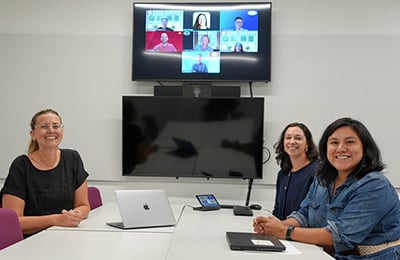Wait times for intervention services to help military families and those living in geographically dispersed areas who have developmental, emotional, or behavioral health concerns can stretch up to three years, and in large states with dispersed populations, long distances to care create more barriers. Researchers and clinicians from the Institute on Community Integration (MN UCEDD) and elsewhere are connecting with providers across Minnesota through a telehealth and tele-mentoring series for practitioners working with these groups.
The University of Minnesota’s TeleOutreach Hub is creating a provider ecosystem to help military families and those living in geographically dispersed areas who have developmental, emotional, or behavioral (D/E/B) health concerns.
Researchers and clinicians from the University’s Masonic Institute for the Developing Brain (MIDB) and the Institute on Community Integration are connecting with providers across the state through Project ECHO® , a telehealth and tele-mentoring series for practitioners working with highly mobile, rural, and military-connected families that is based on a collaborative model first developed at the University of New Mexico.
The effort addresses extreme shortages of developmental pediatricians, child and adolescent psychiatrists, psychologists, behavioral specialists, and early intervention providers, which are even more difficult to access for highly mobile and geographically dispersed families. Wait times for intervention services can stretch up to three years. In large states with dispersed populations, long distances to care create more barriers.
During more than three dozen virtual Project ECHO sessions, groups of professionals are meeting to discuss best practices with didactic and case-based learning. Nearly 40 sessions, which began in April, are planned through the remainder of 2024. Topics include autism, attention deficit hyperactivity disorder, social/emotional concerns, and behavioral challenges.
The work is part of a $3.5 million appropriation through the Biden Administration to MIDB to lower barriers to care for these families. The Department of Defense study, A Research Collaboratory to Explore Best Practices for Expanding Access to Care Through Expansion and Support of Telehealth Care for Children and Families with Behavioral Health Needs, is led by Dr. Jessica Simacek, principal investigator and director of ICI’sTeleOutreach Center, and Dr. Damien Fair , co-principal investigator and co-director of the MIDB.
View Full Article











